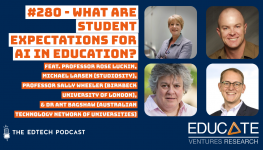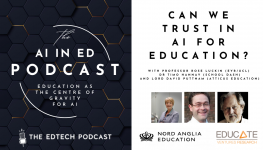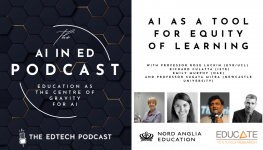#255 – Does It Work? Evidence in EdTech
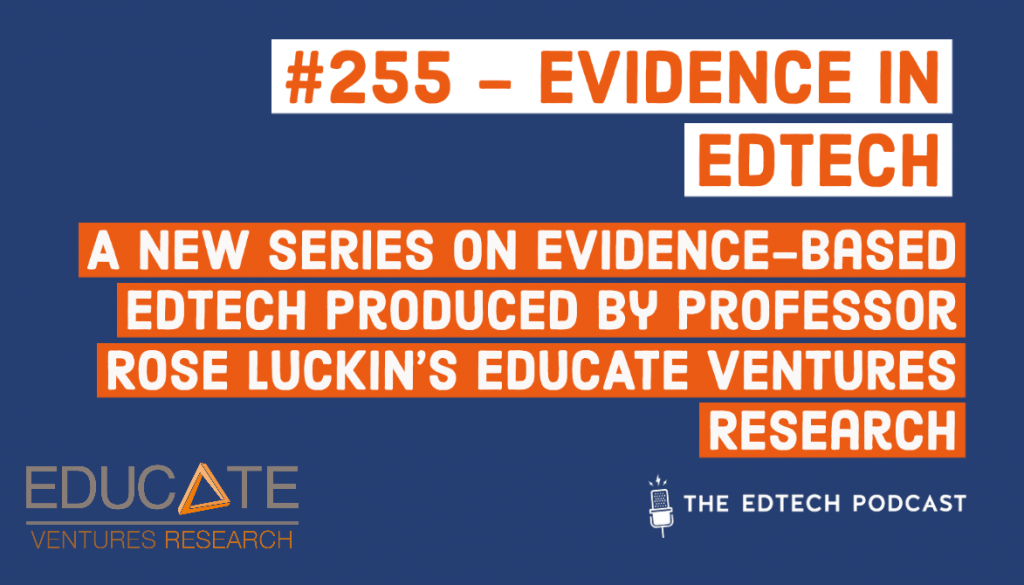
Subscribe on iTunes, Spotify, Stitcher, TuneIn, Google Podcasts, Amazon Music
What’s in this episode?
Welcome to this first episode in a series produced by Professor Rose Luckin’s EDUCATE Ventures Research, exploring ‘Evidence-Based EdTech’, and hosted on The Edtech Podcast.
This mini-series connects, combines, and highlights leading expertise and opinion from the worlds of EdTech, AI, Research, and Education, helping teachers, learners, and technology developers get to grips with ethical learning tools that are led by the evidence.
For this episode we examine the presence of EdTech in schools, looking at how we judge whether the tech ‘works’ or not. We explore what makes for good evidence, why contextual use is significant, and how school CPD, infrastructure development, and staff capacity building are vital to making the most of the tools at our disposal.
Can our schools operate as testbeds for emerging technology, and is this an ethical or beneficial use of class time? Why is an evidence-led investment and regulatory ecosystem so important? What is a ‘research mindset’ for aspiring technology developers, and do users even care about the evidence?
We’ll be asking:
- How do we know EdTech works?
- What does good evidence look like, and what can stakeholders in the ecosystem do to ensure it is high-quality?
- What are the biggest barriers to generating good evidence and getting it into the hands of the people in companies responsible for technology development, and into the hands of those using that technology?
Thank you to SMART Technologies for sponsoring this episode, and for supporting the Evidence-Based EdTech series on the EdTech Podcast.
Guests
- Tom Hooper – Founder and CEO, Third Space Learning
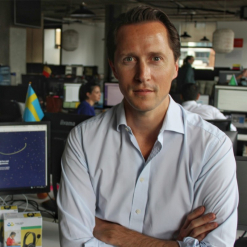
Tom founded Third Space Learning in 2013 and continues to drive the company’s social mission to close the attainment gap. The long term vision for TSL is to provide a technology and training solution for education systems globally, allowing them to distribute their own teaching staff online, supplementing their traditional bricks and mortar model (just like the company is currently doing with English state schools). Third Space’s national success in England is the best example of this opportunity, and their ability to execute.
Neelam Parmar – Director of Digital Transformation and Education, AISL Harrow Schools
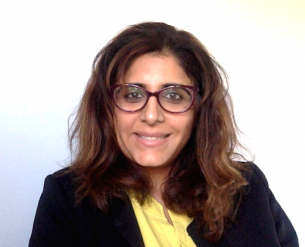
Dr. Neelam Parmar is Director of Digital Learning and Education for Harrow International Schools. She is an award-winning professional, international researcher, author, thought leader and speaker for the use of educational technology, digital pedagogy and innovative curriculum within education.
Richard Culatta – Author, CEO, ISTE

Richard Culatta, chief executive officer, brings vast experience in education policy, teacher preparation, educational technology and innovation to his role with ISTE. Prior to joining ISTE, Culatta served as the chief innovation officer for the state of Rhode Island. In this role, he focused on developing partnerships to improve opportunities for students, including launching a program to make Rhode Island the first state to offer computer science in every K-12 school and creating a state vision for personalized learning.
Katie Novak – Strategist, Writer, Smart Technologies

Katie Novak is a global strategist, writer, and speaker focused on elements that connect us at our core – identity and our sense of self. She is passionate about education and the impact of connecting students to their learning in authentic ways. She brings her experience in museum and outdoor education, advocacy, and community building to each EdShift conversation.
Host
Rose Luckin – Professor of Learner Centred Design, UCL, Founder, EDUCATE Ventures Research

Rosemary (Rose) Luckin is Professor of Learner Centred Design at UCL Knowledge Lab. She was named one of the 20 most influential people in education in the Seldon List, 2017. Rose is Founder of EDUCATE Ventures Research Ltd., a London hub for start-ups, researchers and educators developing evidence-based educational technology. She is past president and current treasurer of the International Society for AI in Education and co-founder of the Institute for Ethical AI in Education.
Thanks and Support
Thank you to SMART Technologies for sponsoring this episode, and for supporting the Evidence-Based EdTech series on the EdTech Podcast.
We would love to hear from you.
- Post your thoughts or follow-on links via Twitter @podcastedtech or via The Edtech Podcast Facebook page or Instagram
Rate and Review
- Drop us a rate or review or share this episode. By doing so, you help other new listeners find our material. Thank you and happy listening!
Thank you to this week’s episode sponsors and supporters

Not just a leading tech company, SMART Technologies is a connections company. Connections matter more than ever. It’s the reason SMART shows up and innovate every day – to create and advance technology that helps teachers, learners, and teams make meaningful connections. Whether you’re engaging learners or collaborating with your teams – no matter where they are – SMART provides interactive technology to make your day simpler and more connected.
Tell us where you are listening in from
We’d love to hear your thoughts. Record a quick free voicemail via speakpipe for inclusion in the next episode. Or you can post your thoughts or follow-on links via twitter @podcastedtech or via The Edtech Podcast LinkedIn page or Instagram.

